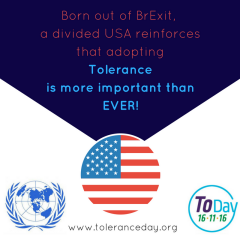Now that the election results are in, and Trump is the next President of the United States, we need to draw a breath and refocus on tolerance.
The election campaign was full of bitterness, contempt and other unsavoury aspects of human nature. Now it’s over, opposing parties have to find a way to live together, to move forward. There is a lot of talk of ‘healing the divide’ but given the poisonous nature of much of the debate, and the fear that the parties seem to have of each other – the first step must be the practice of tolerance.
No matter your views on another’s perspective, respect them enough to understand that they have reasons for their beliefs. You may not agree, you may feel that you know better, but it’s never the case that opinions develop in a vacuum.
It’s time to listen, it’s time to hear what is being said, what has been felt and it’s time to open a dialogue about how to make things better. Imagine yourself in someone else’s shoes before you engage in an attack – the importance of not judging without understanding cannot be overstated. And this is a process and a practice which needs to be encouraged, it needs to be seen as the baseline from which dialogue can begin.
The ToDay campaign was set up to encourage schools to teach the practice of tolerance in primary schools and there is still time to take part. There is a seven step process underlying the materials and lesson plans to support schools and pupils in the development of such practice.
So today we urge you to take part in the ToDay Campaign, as we make plans for taking the campaign to the States.
The Seven Steps:
· Creating an atmosphere of trust and safety to support dialogue
· Problematising tolerance – explore what it actually means, the impact of intolerance, how does that feel, what issues does intolerance cause both personally, in school and in the wider world
· Building confidence and resilience
· Identity, rights and freedoms – understanding what makes me me, similarity and difference, political frameworks, Magna Carta, UN rights of the child, human rights
· Reasoning and reflection; thinking things through in dialogue
· Storytelling; perspective and the power of narrative – understanding story structure, learning to listen and building empathy
· Taking action – the importance of taking meaningful action that brings people together, heals divides, rights wrongs and promotes harmony.

 RSS Feed
RSS Feed